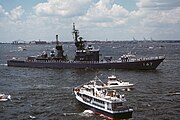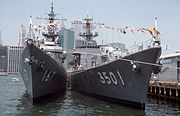JDS Nagatsuki
This article has multiple issues. Please help improve it or discuss these issues on the talk page. (Learn how and when to remove these messages)
|
 JDS Nagatsuki on 4 July 1986
| |
| History | |
|---|---|
| Name |
|
| Namesake | Nagatsuki (1926) |
| Ordered | 1965 |
| Builder | Mitsubishi Heavy Industries |
| Laid down | 2 March 1968 |
| Launched | 19 March 1969 |
| Commissioned | 12 February 1970 |
| Decommissioned | 19 March 1996 |
| Homeport | Maizuru |
| Identification | DD-167 |
| Fate | Sunk as target, 3 August 1997 |
| General characteristics | |
| Class and type | Takatsuki-class destroyer |
| Displacement |
|
| Length | 136.0 m (446 ft 2 in) overall |
| Beam | 13.4 m (44 ft 0 in) |
| Draft | 4.4 m (14 ft 5 in) |
| Propulsion |
|
| Speed | 32 knots (37 mph; 59 km/h) |
| Range | 6,000 nmi (11,000 km) at 16 kn (18 mph; 30 km/h) |
| Complement | 260-270 |
| Sensors and processing systems |
|
| Electronic warfare & decoys |
|
| Armament |
|
JDS Nagatsuki (DD-167) was the fourth ship of the Takatsuki-class of destroyers. She was commissioned on 12 February 1970.[1][2]
Construction and career
[edit]Nagatsuki was laid down on March 2, 1968, at Mitsubishi Heavy Industries Nagasaki Shipyard & Machinery Works as No. 2307, a 3,000-ton type A II guard ship planned for 1966 based on the Second Defense Build-up Plan, and was laid down in 1969. Launched on March 19, 1970, commissioned on February 12, 1970, she was incorporated into the 3rd Escort Group as a ship under direct control and deployed to Maizuru, which remained her homeport throughout her career.
In 1976, Nagatsuki participated in a practicing voyage to the ocean with the training vessel JDS Katori, and at that time, participated in the observing ceremony of the 200th anniversary of the founding of the United States in New York.
On June 15, 1982, a US-1 flying boat belonging to the 31st Fleet Air Group, which was undergoing water landing training off the coast of Cape Ashizuri, broke its left float upon landing and was unable to take off water and drifted, so it was being trained nearby. The ship was towed and returned to Iwakuni base.[relevant?]
On March 30, 1984, the 2nd Escort Corps was newly formed under the 3rd Escort Corps group and incorporated with sister ship Mochizuki.
In 1986, Nagatsuki participated in a practicing voyage to the ocean, at which time she participated in the International Fleet Review Ceremony for the 100th Anniversary of the Statue of Liberty in New York.
On January 25, 1989, the 2nd Escort Corps was reorganized under the Maizuru District Force.
Nagatsuki participated in a training voyage to North America from June to November 1994 as the flagship of the training fleet, which consisted of escort vessels Takatsuki, Mochizuki, and Shirayuki. For this reason, a wood grain sheet was attached to the equipment of the salute[clarification needed] (removed after the end) and the equipment panel of the officer's room.
Nagatsuki was decommissioned on April 1, 1996, and a year later, on August 3, 1997, she was sunk as a target ship north of Wakasa Bay by bombardment by Hiei, Takatsuki, and Natsushio.[3]
Nagatsuki's bell was the one that was installed on the former Imperial Japanese Navy's Mutsuki-class destroyer Nagatsuki that was stranded in the Bennett cove, Kolombangara Island. That Nagatsuki was dismantled after the war, but her bells were kept by the locals at that time, and then the ones brought back to Japan were handed over to the Maritime Self-Defense Force by the efforts of the then general manager of the Kure district, Tatsuo Chikudo, in November 1970. The bells were fitted to the ship on 17 March.[year needed][4]
After the ship's retirement, both the Nagatsuki's bell are both preserved at the Maizuru Navy Memorial Hall.
Gallery
[edit]-
JDS Nagatsuki at New York Harbor on 4 July 1986.
-
JDS Nagatsuki and JDS Katori at New York Harbor on 4 July 1986.
References
[edit]- ^ "Takatsuki class Destroyer Japan Maritime Self Defense Force". www.seaforces.org. Retrieved 30 October 2020.
- ^ "DDA Takatsuki Class". www.globalsecurity.org. Retrieved 30 October 2020.[unreliable source?]
- ^ "世界の艦船" [News Flash]. Ships of the World (in Japanese). No. 531. Kaijinsha. November 1997. p. 64.
- ^ "長月の時鐘がながつきに復活" [The bell of Nagatsuki returns to Nagatsuki]. Japan Maritime Self-Defense Force News (in Japanese). No. 164. Kaijinsha. April 1971. p. 81.
Bibliography
[edit]- Ishibashi, Takao (2002). 海上自衛隊全艦船 1952-2002 [All Ships of the Maritime Self-Defense Force 1952-2002] (in Japanese). Namiki Bookstore.
- 増刊第66集 海上自衛隊全艦艇史 [Special Issue No. 66: History of All Ships of the Japan Maritime Self-Defense Force]. Ships of the World (in Japanese). Kaijinsha. 2004.
- 世界の艦船 第750集 [World Ships Vol. 750] (in Japanese). Kaijinsha. November 2011.


